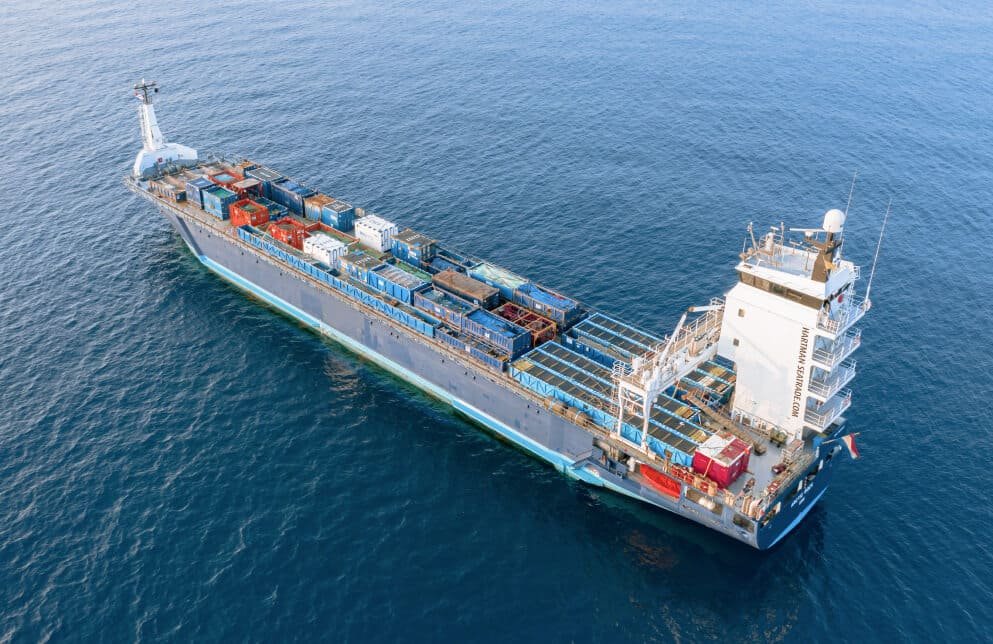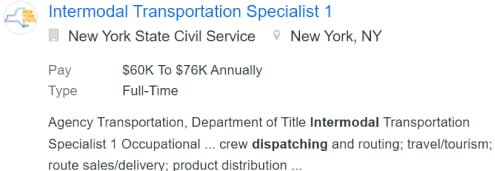The responsibilities of an intermodal dispatcher are to coordinate the schedule of a shipping company or a group of drivers and to ensure that data related to deliveries and shipments of freight are entered into a log.

The responsibilities of an intermodal dispatcher are to coordinate the schedule of a shipping company or a group of drivers and to ensure that data related to deliveries and shipments of freight are entered into a log.



There are always a lot of jobs and good specialists are always in demand. Since there are many largest ports in the world, in particular in the USA.
On the course, we will look at the main ports of New York City, study their websites, the specifics of their work, and get acquainted with the cargo tracking service. And this will give you a complete vision of the fact that there are really a lot of robots in this area, having studied the intermodal dispatcher you will be in a big plus.

In this lesson you will learn about such topics:
What does the course consist of?
How much does the company earn from one driver per month.
Dispatcher Responsibilities.
What is import, export and straight turn?
This lesson contains information about types and sizes of containers.
You’ll find out how carriers move them due to the Import and Export conditions.
We’ll share information on how to keep and move them wisely.
The third lesson is about types of ports.
Find out where you can return a container.
We observe the work of an Intermodal dispatcher on the example of NY and NJ ports.
Here a student learns about working both with Import and Export.
How a dispatcher plans a container movement for loading or unloading.
Learn about the process of Straight Return.
Unknown words always become an obstacle in studying a new field. The fifth lesson contains all definitions and explanations to new terms.
We share a list of documents that an Intermodal dispatcher works with. You’re going to see templates and we will explain how to fill them in.
Movement of containers is rather confusing and demands practice but we’ve prepared a good lesson for you to sort out things. Learn the conditions of returning containers back.
Follow the stages we’ve fully described in this lesson about chartering of containers.
Meet the detailed information about containers and you’ll have an understanding of the types you’d better work with.
Form a whole picture about Trailers that are used in Intermodal transportation. Read about rent conditions and their prices.
Learning a dispatcher’s software which is called Profit Tools. Explaining and showing how to maintain the turnover document.
Improving negotiating skills is very important due to the aim of growing business. Study this lesson of business correspondence, how to form sentences, what techniques are the best to use when dealing with your potential partner.
Systemize data: numbers of loads, container numbers, and more. In this lesson you have an opportunity to learn how to process data, enter a working system and how the whole billing procedure is done.
We want to clear up an issue of intermodal transportation and who actually can work with ports. We describe a suitable partner for the Steamship line company.
Fulfill your understanding with knowledge of occupation in a trucking business. It’s important to know about the responsibilities of a certain profession. Learn about a Freight Forwarder in the 15th lesson.
Get to know about conditions that influence prices. Learn how these rates are basically formed according to the cooperation with ports.
We invite you to feel an atmosphere of a typical intermodal dispatcher’s day. In this lesson you’ll see how all the previous lessons work in real life. What timings are when you plan an Export and Import trip. Find out about life hacks in communication with your clients and many more in the lesson.
Theory without practice is nothing, that’s why we prepared practical tasks to test and challenge your understanding of the whole material. Prove yourself that you are ready to start your Intermodal career! These tasks are based on real cases that dispatchers might face. Try solutions before you start working. We believe in you.

It is understandable that wage depends on the State and company you work with. We can say that the average salary for intermodal dispatcher is $50 298. Last updated in March.
The responsibilities of an intermodal dispatcher are to coordinate the schedule of a shipping company or a group of drivers and to ensure that data related to deliveries and shipments of freight are entered into a log
There are open Intermodal Dispatcher jobs in several cities including Mississauga, Woodbridge, Surrey, Calgary, Varennes, Montreal, Etobicoke, Winnipeg, Brossard, Edmonton.
The top companies hiring now for Intermodal Dispatcher jobs are PCB Freight Management, PDI Bulk, P&W Intermodal, CANADA DRAYAGE INC, Action Force Transport Limited, Fastfrate Group, ITN Logistics, Pacific Customs Brokers Ltd., Vitran Express Inc, GT Intermodal / GT Group.
There are two types of intermodal: Container-On-Flatcar (COFC) or Trailer-On-Flatcar (TOFC). Under the TOFC model, the over-the-road (OTR) trailer is placed directly onto the wellcar versus an intermodal container.
Since the infrastructure capacity is limited, small disturbances in traffic flow (e.g., accidents, congestion, road maintenance) can cause delays and infeasibility of any transportation plan.
Containers, also known as intermodal containers or ISO containers because the dimensions have been defined by ISO, are the main type of equipment used in intermodal transport, particularly when one of the modes of transportation is by ship.
The World Shipping Council (WSC) reported that an average of 1,382 containers were lost at sea between 2018 and 2019.
Many Intermodal Dispatcher jobs require experience in a role such as Dispatcher. Most Intermodal Dispatchers also have previous career experience in roles such as Customer Service Representative or Operations Manager.
Knowledge of FMCSA rules.
Full awareness of Driver pay and percentage based freight.
To calculate fuel surcharges.
Must be proficient with most mainstream office software, including: G Suite (Google Docs, Sheets, Slides), Microsoft Office (Word, PowerPoint, Excel), and Email and calendar scheduling tools (Outlook, Google Calendar)
Fast and accurate typing with data entry.
Knowledge of procedures and guidelines for emergency situations.
Organizational and multitasking abilities.
Open for acknowledging mistakes with excellent communication skills.